Michael Greeson of the Diffusion Group picks up on a theme we’d also raised earlier in the week – the insanity around Apple’s recent announcements, here he focuses on AppleTV.
AppleTV Unwrapped
On January 9, Steve Jobs made good on his 2006 promise to release an Internet TV Adapter (iTVA) and rolled out AppleTV, a set-top box that allows you to stream video from your PC to your TV. This was an important move for Apple and for the entire broadband video industry; one TDG predicted several years ago would likely happen in 2007.

I don’t want to talk about the technology behind the AppleTV platform – you’ve all heard by now that it’s an 802.11n-based wireless media hub with a 40GB hard drive and Intel processing, and is capable of streaming video, music, and photos to up to 5 different PCs. You’ve also likely heard that it will hit the market in February and cost $299 (although those who simply can’t wait to say they’ve bought one can pre-order the devices as of last Tuesday).
So the real reason for this particular OpEd? The often nauseating level of presumption extended to Apple by the public media and (in many cases) the analytical community. It’s as if everything that Apple touches will not only turn to gold but fundamentally redefine how we experience media [1].
You Don’t Want This Kind of Hype
An AP article in this morning’s New York Times captured the dominant opinion regarding AppleTV, stating that it “could be as revolutionary to digital movies as Apple’s iPod music player was to digital music. [2] ”
In what world do these people live? Are they completely oblivious to the fact that Internet-enabled DVRs and set-top boxes, not to mention digital media adapters, have been around for a couple years? Are they aware that the latest generation of game consoles do pretty much the same thing as AppleTV (sans iTunes), including burning content to an embedded hard drive?
Why is Apple’s entry into this space considered “revolutionary” when so many others offering similar solutions were there first? Are they aware that, despite the fact that MacWorld may have been a more exciting show than CES, the number of PC-to-TV solutions, Internet-capable TVs, networked set-top boxes at CES was topped only by the number of attendees? Everyone’s in the game, so Apple’s entry could hardly be considered “revolutionary.” Again, this is convincing evidence of the press’s blind fascination with all things ‘Apple.’
But this should also be a concern for Apple itself. Could these pundits have possibly set the expectations for this device (and the whole concept of Internet-based digital video to the TV) any higher? There is no way Apple can live up to this kind of hype.
Second, these pundits are guilty of using an analogy which, however seductive, is so unrealistic it borders on being dangerous. Betting that the future of Internet video will simply mirror that of Internet music is foolish, and those spouting this nonsense should, well, have their iPods taken away for a week.
 Let’s Get Serious, If Only For A Moment
Let’s Get Serious, If Only For A Moment
Here is a litany of knee-jerk, prima facie objections to the pundits (the other pundits, that is) blind proclamation.
First, AppleTV is not the iPod. (Really? Yes, really. And neither will AppleTV enjoy the success of the iPod – again, the bar is simply set to high and such placement shows a poor understanding of the marketplace.)
Second, the online video business is not a simple mirror image of the online music business. (Yes, the similarities are strong but they are not universal. For example, purchasing a song download at $.99 is quite different than purchasing a movie download for $150-$20. Just ask someone who doesn’t work in the business how appealing this sounds. TDG has done the research and less than 13% of consumers would respond positively to such an offering.) As Dawn Chmielewski noted in Wednesday’s Los Angeles Times, no one knows whether the entire PC-to-TV or Internet-to-TV strategy will pay off, and if it does to what extent it will float all boats [3].
Third, iTunes on the TV is not the same as iTunes on the PC. (Nor should it be – Apple must avoid the temptation to simply duplicate the iTunes web store on the TV screen.)
Fourth, the ‘for-purchase only’ model of iTunes remains unproven. (Despite the fact iTunes has sold 50 million TV episodes and more than 1.3 million feature-length films, the real long-term winner may be movie rentals, not sell-thru.)
Fifth, the cable, satellite, and TelcoTV players will not sit still and let someone like Apple, Sony, or Microsoft simply step in and cannibalize their TV revenue. (Yes, the future of Internet TV is bright – TDG just released an analysis and forecast on the growth of Internet-enabled TVs. However, allowing consumers access to a wide variety of unique content that is not carried by the major players is not the same as offering a movie service that competes directly with the incumbent video offerings – especially movies.)
The list of objections can go on for pages. For TDG’s clients and frequent readers, you are aware that we remain as excited about Apple’s entry into the living room as the next pontificator. In the long term, this will have a positive impact upon both the ‘digital home’ and ‘connected consumer’ industries. However, this box is not ‘revolutionary’ in the slightest, nor is moving iTunes to the TV. This is just the latest move by a very important technology innovator, a market leader whose every move is in the professional and public eye.
Despite the widespread cry of ‘revolution,’ the public has yet to weigh in on Internet video-to-the-TV in general and Internet movie downloads in particular, so that best that can be said is that the jury is still out. Research indicates that those that have used iTunes for video downloads are but a small portion of total iTunes users and comprised primarily of tech enthusiasts. Apple knows it will take a lot longer for iTunes to sell two billion online movie downloads at $20 than it did to sell two billion individual music downloads at $.99.
So let’s turn down the hype surrounding AppleTV. No doubt the expansion of Internet video into the living room is real; however, its emergence as a force in our TV viewing lives will be evolutionary or incremental in nature, not revolutionary. In other words, the AppleTV revolution will not be televised.
For a more sober look at Internet video on the television, The Diffusion Group would be delighted if you took a look at their latest report , Broadband Video: Redefining the Television Experience.
[1] This morning’s Good Morning Silicon Valley began with a headline entitled “You know, if the analyst gig doesn’t work out, there’s always a job for you in Apple PR,” a reflection on the fact that virtually every analyst on the planet was under the control of some sort of Apple-esque reality distortion field.
[2] “Apple Unveils New Mobile Phone,” Rachel Konrad, Associated Press, January 9, 2007
[3] “TV May Be A Tougher Challenge,” Dawn Chmielewski, Los Angeles Times, January 10, 2007.
Michael Greeson, Founding Partner & Principal Analyst, The Diffusion Group
 A new survey has seen Google continuing to exert its dominance on the US web search market, grabbing a huge 47.4 per cent of the sector, up 0.4 per cent during December.
A new survey has seen Google continuing to exert its dominance on the US web search market, grabbing a huge 47.4 per cent of the sector, up 0.4 per cent during December. Also heading downwards was InterActiveCorp’s Ask.com search engine, slipping 0.1 per cent to 5.4 per cent.
Also heading downwards was InterActiveCorp’s Ask.com search engine, slipping 0.1 per cent to 5.4 per cent.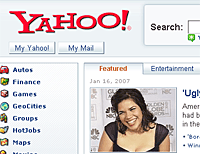 The overall US search market has ballooned by 30 per cent since December of 2005, with comScore reporting that consumers performed 3.2 billion searches on Google sites and 1.9 billion searches on Yahoo!
The overall US search market has ballooned by 30 per cent since December of 2005, with comScore reporting that consumers performed 3.2 billion searches on Google sites and 1.9 billion searches on Yahoo! High spending Americans splashed out over 100 billion dollars buying stuff on the web last year, with the popularity of Internet shopping set to keep on soaring.
High spending Americans splashed out over 100 billion dollars buying stuff on the web last year, with the popularity of Internet shopping set to keep on soaring.
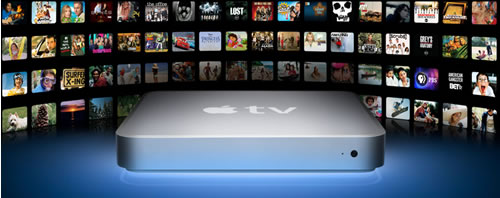
 Let’s Get Serious, If Only For A Moment
Let’s Get Serious, If Only For A Moment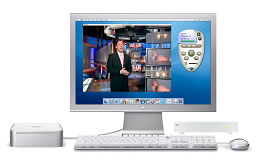 TiVo has been shipping their PVRs with an Ethernet port since their series 2 model, promising content delivered over broadband.
TiVo has been shipping their PVRs with an Ethernet port since their series 2 model, promising content delivered over broadband.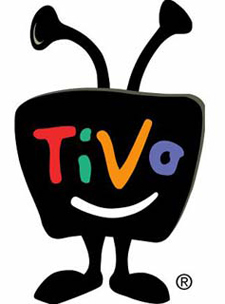 TiVoToGo for the Macintosh
TiVoToGo for the Macintosh It may only be a few days after the New Year, but the party poppers and drinks cabinet have been rolled out at Chez BT as the company is poised to rack up its 10 millionth broadband connection this week.
It may only be a few days after the New Year, but the party poppers and drinks cabinet have been rolled out at Chez BT as the company is poised to rack up its 10 millionth broadband connection this week. The remaining 1.3 million lines are supplied to big names like Carphone Warehouse and BSkyB via BT Openreach.
The remaining 1.3 million lines are supplied to big names like Carphone Warehouse and BSkyB via BT Openreach. It truly was a battle of the consoles this Christmas, with big-hitters Microsoft, Nintendo and Sony all looking to set the Yuletide cash tills ringing.
It truly was a battle of the consoles this Christmas, with big-hitters Microsoft, Nintendo and Sony all looking to set the Yuletide cash tills ringing.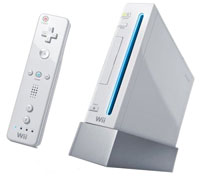
 It was a similar situation in the UK, with Nintendo Wii’s near-impossible to find in the shops (yes, we were looking too and someone’s still waiting for their Christmas present!).
It was a similar situation in the UK, with Nintendo Wii’s near-impossible to find in the shops (yes, we were looking too and someone’s still waiting for their Christmas present!).